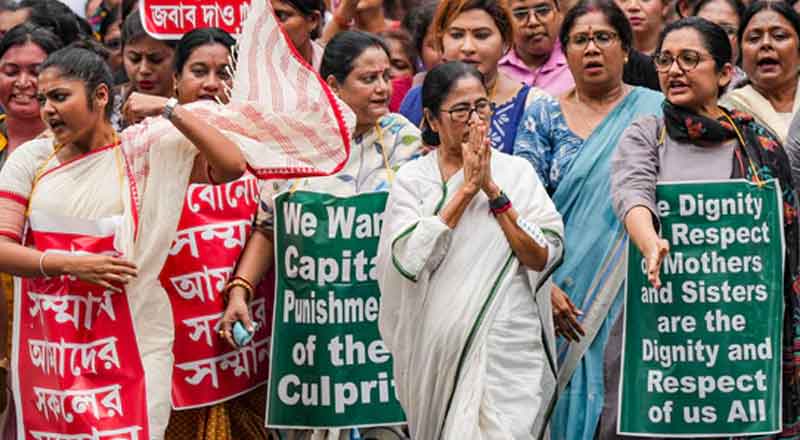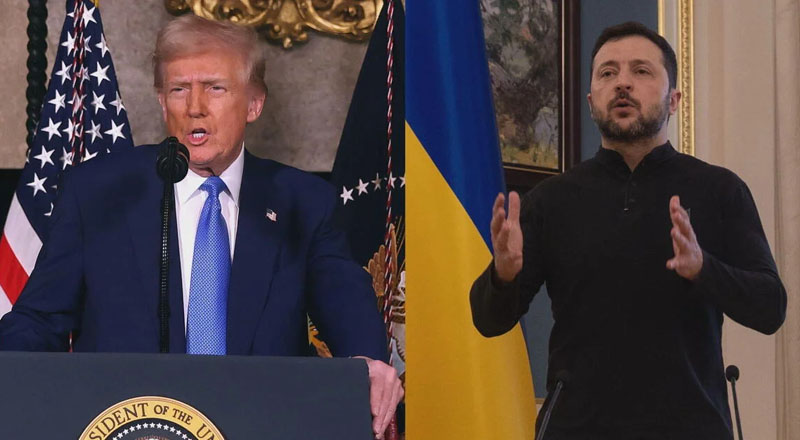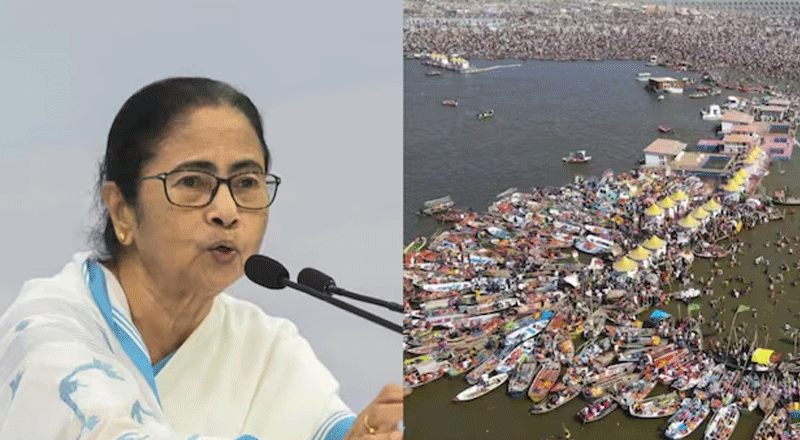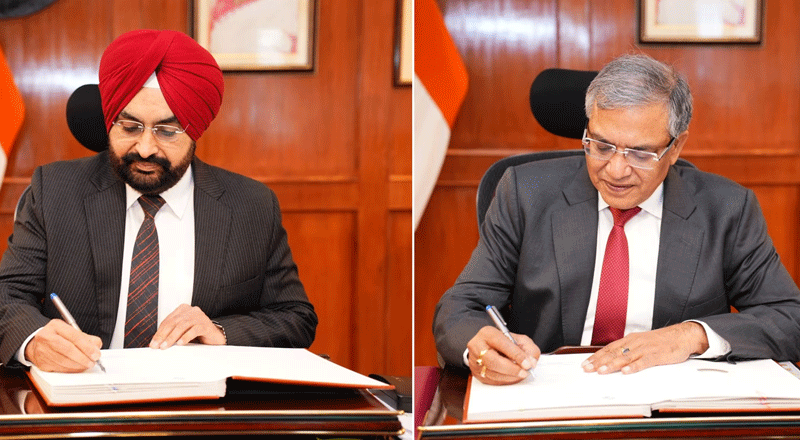West Bengal is currently engulfed in an unprecedented wave of protests, with Chief Minister Mamata Banerjee facing intense pressure like never before. The public outrage stems from the horrific rape and murder of a junior doctor at Kolkata’s RG Kar Medical College on August 9. The incident has placed the Trinamool Congress (TMC) and its leader, Mamata Banerjee, in an extremely precarious position, challenging her reputation as the champion of “Maa, Maati, Manush” (mother, land, and people).
As protests continue to grow more intense across the country, the West Bengal government’s response to the crisis has only exacerbated the situation. Over ten days have passed, and the actions taken by Mamata Banerjee and her administration, including the Kolkata Police, have failed to quell the unrest. Instead, these missteps have fanned the flames of public anger. The Supreme Court recently chastised the state government for its handling of the case, further intensifying the scrutiny on Mamata Banerjee’s leadership.
Below, we explore the major blunders by Mamata Banerjee and the Kolkata Police that have contributed to the escalation of this crisis, undermining public trust and deepening the sense of injustice.
Attempt to Cover Up the Kolkata Rape-Murder Case
The mishandling of the RG Kar rape-murder case began from day one, with allegations of attempts to cover up the crime. Initially, the incident was portrayed as a suicide, despite the discovery of the junior doctor’s half-naked body in the seminar room of RG Kar Medical College, bearing multiple injuries. Hospital officials initially reported that the victim had taken her own life. However, a subsequent autopsy revealed that she had been brutally raped by more than one person and murdered.
The autopsy findings were shocking: sixteen external and nine internal injury marks, death due to manual strangulation and smothering, and evidence of forceful penetration. These details exposed the grave nature of the crime, which the authorities had attempted to downplay. The delay in registering an FIR and the subsequent revelations from the autopsy have cast serious doubts on the intentions of those in charge, including the Kolkata Police, which answers directly to Mamata Banerjee.
Parents Kept Waiting and a Rushed Cremation
Adding to the tragedy, the parents of the victim were subjected to further trauma. They were made to wait for over three hours to see their daughter’s body. The victim’s mother accused the Kolkata Police of trying to close the investigation quickly and not cooperating with the family. The rushed cremation of the victim’s body, despite the ongoing investigation, raised suspicions of an attempt to cover up evidence.
The victim’s father claimed that his daughter’s body was cremated hastily, even though two other bodies were present at the crematorium. The police reportedly directed the cremation to be carried out on priority as a large crowd gathered, further fueling public anger and distrust.
Negligence in Investigation and the Insulting Compensation Offer
The handling of the investigation by the Kolkata Police has been criticized for its gross negligence and possible complicity. Initially, the police informed the victim’s parents that she had committed suicide, only to later reveal that she had been raped and murdered. The mismanagement of information and the subsequent attempts to cover up the crime raised serious questions about the police’s credibility.
Moreover, the police were accused of destroying crucial evidence, including a diary kept by the victim that may have contained details about her harassers. The victim’s father alleged that a page from the diary was found to be torn. Adding insult to injury, the West Bengal government offered the victim’s family a compensation of Rs 10 lakh—a move that was seen as an attempt to silence the family rather than deliver justice.
Suspicious Renovation Near the RG Kar Crime Scene
Amid the ongoing investigation and protests, a sudden renovation near the crime scene raised further suspicions. Masonry work inexplicably began near the seminar hall where the crime took place, with a portion of the bathroom wall adjacent to the hall being broken down. This renovation, occurring during such a critical investigation, led to allegations of an attempt to destroy evidence. The timing of the work was so questionable that it even drew criticism from the Calcutta High Court.
RG Kar’s Principal Resigns and Gets a Plum Posting
The Mamata Banerjee administration has also been accused of protecting those responsible for the initial cover-up of the incident. Sandip Ghosh, the principal of RG Kar Medical College, who was accused of attempting to label the incident as a suicide, resigned from his position. However, instead of facing disciplinary action, he was transferred to the prestigious Calcutta National Medical College and Hospital. This move raised eyebrows, as many suspected that Ghosh was being rewarded for his loyalty to the ruling party rather than being held accountable for his actions.
Mismanagement of Protests by the State Government
From the very beginning, the protests by fellow doctors and the public were met with resistance from the state government. Instead of addressing the legitimate concerns about women’s safety and workplace security, the government accused the protesting doctors of causing public distress by going on strike. The state’s response was characterized by a lack of sensitivity, with implicit pressure being exerted on doctors to return to work.
The situation escalated further when the crime scene at RG Kar Medical College was vandalized on August 14. Despite the ongoing investigation, the state government failed to prevent the vandalism, which many saw as an attempt to tamper with evidence. The subsequent decision to send Ghosh on leave, after the Calcutta High Court’s harsh criticism, was seen as too little, too late.
Failure to Prevent Vandalism at RG Kar Medical College
The failure to prevent the vandalism at RG Kar Medical College on August 14 was a major blunder that highlighted the ineffectiveness of the Kolkata Police. As peaceful protests turned chaotic, with the hospital being vandalized, the police stood by as mute spectators. Allegations surfaced that the vandalism was carried out by “TMC goons” who sought to tamper with the crime scene, further eroding public trust in the police and the state government.
Cancellation of Kolkata Derby and Suppression of Public Dissent
The handling of the Kolkata Derby match between Mohun Bagan and East Bengal on August 14 further demonstrated the state government’s attempt to suppress public dissent. The match was canceled and moved to Jamshedpur, Jharkhand, with the police citing security concerns amid widespread protests. However, many fans and critics argued that the real reason behind the cancellation was to prevent mass protests and banners demanding justice for the victim and the resignation of Mamata Banerjee.
The cancellation was seen as another attempt by the Mamata administration to suppress public outrage and silence dissent. The decision to shift the match was widely criticized, with many viewing it as a show of authoritarian rule by the state government.
Blame on Media and Crackdown on Social Media Critics
As the protests continued to grow, the Mamata Banerjee administration adopted a repressive approach to quell the unrest. The Kolkata Police Commissioner blamed the media for spreading “false news” and contributing to the chaos. This narrative was echoed by TMC leaders, who sought to deflect criticism by accusing the media of politicizing the issue.
The state government also cracked down on social media critics, including influencers, YouTubers, students, and doctors, who were accused of “revealing pictures or the identity” of the junior doctor. Even TMC Rajya Sabha MP Sukhendu Sekhar Roy was not spared, as the Kolkata Police issued notices to him for his critical posts on social media. In total, 280 people were issued notices, and a 23-year-old student was arrested in connection with the protests, further deepening the sense of injustice.
Mamata Banerjee’s Protests Against Mamata Banerjee
In a move that many saw as ironic, Mamata Banerjee herself took to the streets to protest against the very system she oversees. She demanded the death penalty for those involved in the rape and murder, even though the Kolkata Police, under her Home Ministry, had been accused of negligence in the case. Banerjee’s public protests were widely mocked by the opposition, who suggested that she should march for the resignation of the Home Minister—herself.
As the crisis deepens, Mamata Banerjee’s administration is grappling with an unprecedented backlash. Every attempt by the state government to regain control has only compounded the blunders of the past ten days. With public trust diminishing and protests continuing to swell, the TMC government now teeters on the edge. The horrific crime at RG Kar Medical College has exposed the deep flaws in Mamata Banerjee’s administration, and the ten blunders outlined above have only served to deepen the crisis.
(With inputs from agencies)





